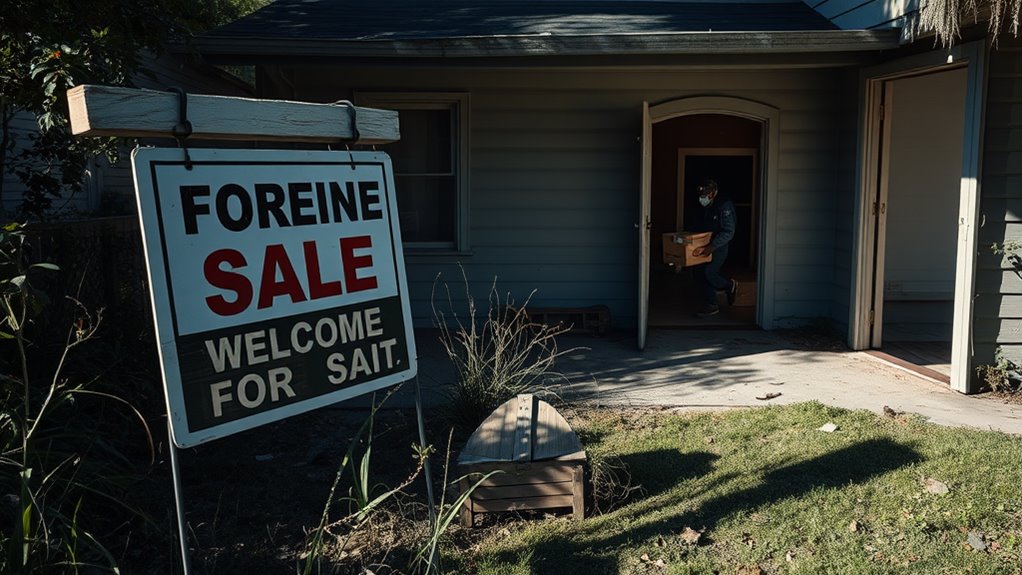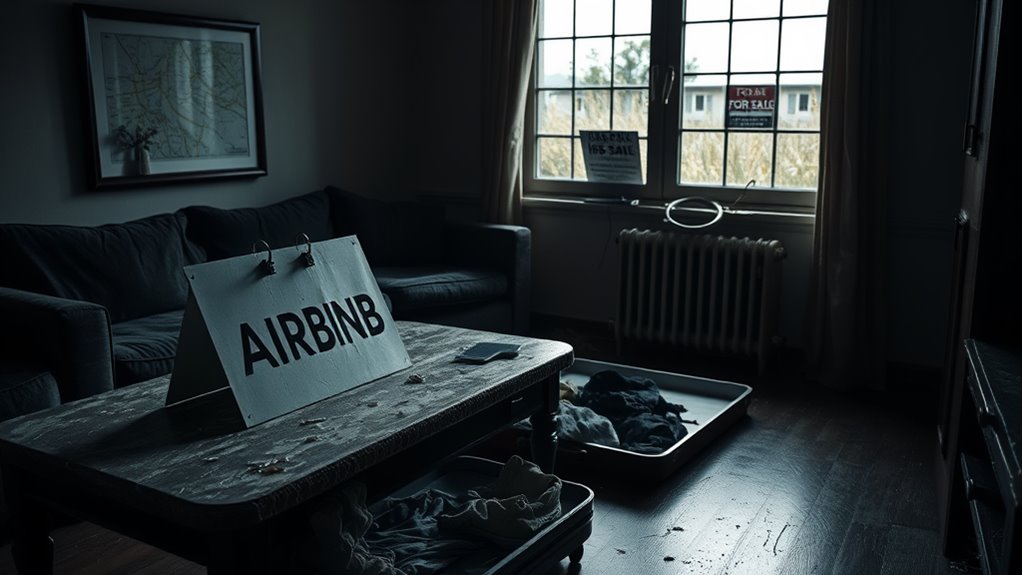You’re seeing signs of an Airbnb collapse, with profits dropping sharply and stock prices falling 21% in six months. New regulations like Local Law 18 are squeezing hosts, while rising costs and market saturation force price cuts. Occupancy rates are down, and competition from hotels is intensifying. Travelers now prefer unique stays, shifting demand. These challenges raise questions about Airbnb’s long-term stability. To understand the full picture, explore the factors shaping its future.
Key Takeaways
- Airbnb faces financial strain with profits down and stock prices dropping 21% in six months.
- New regulations and rising costs are squeezing host profitability, leading to market exits.
- Oversaturation of listings has forced hosts to cut prices, reducing occupancy and revenue.
- Consumer preferences shift toward luxury stays, pressuring hosts to upgrade properties and adapt offerings.
- Long-term viability is uncertain as economic challenges and competition impact Airbnb’s market dominance.
Signs of Airbnb Collapse
As recent earnings reports reveal, Airbnb’s profits have sharply declined, with its stock price plummeting 21% over the past six months, a clear indicator of financial instability. This downturn is partly driven by challenges in the short-term rental market, which has seen reduced demand due to economic slowdowns and inflation, leading to lower discretionary spending on travel. Occupancy rates have dropped, cutting into host revenues and forcing many to lower prices, further eroding profitability. Increased competition from traditional hotels, which now offer more competitive pricing, has also intensified pressure on Airbnb’s market share. Additionally, oversaturation of rental listings has created a glut, pushing hosts to sell properties or exit the market entirely. Regulatory challenges have further complicated the situation, with local laws and zoning restrictions impacting operational viability. These factors collectively signal a precarious financial position for Airbnb, highlighting broader struggles within the short-term rental sector. The company’s declining stock performance underscores the urgency of addressing these systemic issues.
Impact of New Regulations on Airbnb Hosts
While Airbnb’s financial struggles continue, new regulations are placing additional burdens on hosts, reshaping the short-term rental landscape. Cities like New York have introduced stringent measures, such as Local Law 18, requiring hosts to register and comply with local housing laws, which often limit their operational flexibility. Across the U.S. and Europe, restrictions on the number of days properties can be rented short-term are directly reducing host income potential. Additionally, compliance costs, including permits and legal fees, are escalating, squeezing profitability and forcing some hosts to exit the market. This regulatory pressure has prompted many hosts to migrate to less regulated platforms, such as Vrbo, further diluting Airbnb’s market share. The cumulative effect of these regulations has led to a notable decline in the number of active hosts, contributing to a broader contraction in the short-term rental industry. Hosts now face a challenging environment where regulatory compliance is increasingly pivotal to survival. Economic uncertainty is also driving more individuals towards long-term renting, further impacting the short-term rental market.
Rising Costs and Inflation Squeezing Margins

You’re seeing increased platform fees from Airbnb and Vrbo eat into your profits, with hosts reporting up to 15% losses in some cases. While consumer preferences shift toward premium accommodations, you’re struggling to offset these costs due to heightened competition. Inflation-driven operational expenses further squeeze your margins, leaving little room for sustainable growth.
Increased Platform Fees
Increased platform fees on Airbnb have greatly impacted hosts’ profitability, particularly as rising operational costs and inflationary pressures compound the financial strain. Short-term rental hosts now face tighter margins due to these increased platform fees, which have been exacerbated by higher expenses for cleaning, maintenance, and other operational needs. For many hosts, the combination of inflating costs and elevated fees has made it increasingly difficult to sustain profitability. In oversaturated markets, hosts are often forced to lower prices to remain competitive, further eroding their earnings. This financial burden has led some to reconsider their participation on the platform, with a growing number contemplating selling their properties due to diminished returns. The rising fees, coupled with broader economic pressures, are creating significant challenges for hosts maneuvering the short-term rental landscape. Implementing dynamic pricing strategies could help hosts adapt to fluctuating market demands and optimize their rental income.
Premium Pricing Shift
As operational costs and inflation continue to rise, the short-term rental market has seen a significant shift toward premium pricing, putting hosts’ margins under increasing pressure. You’re now facing higher expenses for cleaning, maintenance, and property management, which directly cut into your profits. This premium pricing trend has made affordability a concern for travelers, driving some to traditional hotels offering competitive rates. Additionally, platforms like Airbnb and Vrbo have increased listing fees, further squeezing your financial margins. Florida’s low tax burden creates a favorable environment for maximizing rental property returns, offering a potential advantage in managing these rising costs.
- Rising costs: Cleaning, maintenance, and management expenses are eroding profitability.
- Affordability concerns: Higher booking prices push travelers toward hotels.
- Saturation: Increased competition forces hosts to rethink business strategies.
If you’re a host, the combination of these factors is forcing tough decisions, with many considering selling their rental properties due to financial strain.
Market Saturation and Increased Competition
With the number of Airbnb listings surging in major cities, market saturation has become a pressing issue for hosts. In urban hubs like New York, Los Angeles, and Paris, the oversupply of rentals has greatly outpaced demand, leading to reduced occupancy rates. This glut in local housing has forced hosts to slash prices or invest in property upgrades to stay competitive, squeezing profit margins as operational costs rise. Additionally, the rise of alternative platforms like Vrbo and Booking.com has fragmented the short-term rental market, further intensifying competition. As more listings flood the market, many hosts are grappling with financial strain, with some considering selling their properties due to unsustainable conditions. The sheer volume of available units has turned what was once a lucrative venture into a saturated field, challenging hosts to adapt or exit the market altogether.
Shifting Consumer Preferences in Short-Term Rentals

You’re seeing a clear preference for luxury over budget options, as travelers prioritize high-quality amenities and unique stays in private accommodations. Privacy has become a significant factor, with guests increasingly choosing rentals that offer seclusion over crowded hotels. Experiences now outweigh basic stays, driving demand for properties that provide local, immersive activities rather than standard lodging options. Effective property management is essential to meet these evolving demands and ensure rental success.
Luxury Over Budget
Travelers in the short-term rental market are increasingly favoring luxury experiences over budget-friendly options, reshaping the industry’s dynamics. This shift has led to higher booking prices and a focus on premium listings, leaving traditional budget accommodations struggling to compete. Hosts are now pressured to upgrade features like high-end furnishings, private pools, and concierge services to attract discerning guests. The rise of luxury offerings has fragmented the customer base, forcing budget-focused hosts to adapt or face declining occupancy rates. As demand for luxury experiences grows, many budget listings are seeing reduced relevance, resulting in financial strain. To mitigate risk, some hosts are exploring real estate syndication to pool resources into more competitive properties.
- Pricing Shifts: Bookings for luxury rentals now command higher prices, reshaping host strategies.
- Amenity Upgrades: Hosts invest in premium amenities to meet traveler expectations.
- Occupancy Challenges: Budget listings face declining demand as luxury stays dominate.
Privacy Over Crowds
As consumer preferences evolve, privacy has become a cornerstone of short-term rental decisions, driven by a 30% increase in travelers prioritizing personal space since 2021. The COVID-19 pandemic accelerated this shift, with many now opting for secluded, private accommodations over crowded hotel environments. Short-term rentals, offering unique and isolated lodging options, have gained traction as a result. Hosts are adapting to this demand by enhancing features like separate entrances and outdoor spaces, which further elevate the appeal of these properties. Additionally, the rise of remote work and leisure stays has reinforced the preference for short-term rentals, as travelers seek environments that balance productivity with relaxation. This trend underscores a clear transformation in how people choose accommodations, prioritizing privacy and personal space above all else.
Experiences Over Stays
With the rise of unique experiential offerings, short-term rental preferences are shifting dramatically, as 60% of travelers in 2023 opted for distinctive accommodations over traditional hotel rooms. You’re now more likely to seek vacation rentals that provide immersive experiences, such as stays in treehouses, boutique homes, or properties that reflect local culture. Platforms like Airbnb have responded by prioritizing features that emphasize local tours and activities, catering to your desire for deeper engagement with destinations. Economic factors like inflation are also pushing you to prioritize value, driving a preference for stays that include amenities or experiences enhancing your trip. Competition is intensifying, compelling hosts to adapt by offering more curated and experience-driven lodging options. Family demographics also play a crucial role in shaping rental preferences, with larger families seeking spacious accommodations that meet their unique needs.
- Personalization: Travelers increasingly choose accommodations that offer unique, culturally immersive stays.
- Value-Driven Decisions: Inflation has made travelers prioritize rentals that include experiences or amenities.
- Platform Adaptation: Airbnb and others are focusing on experiential offerings to meet demand.
Assessing Airbnb’s Long-Term Viability
While Airbnb has reshaped the short-term rental industry, its long-term viability is under scrutiny due to a confluence of challenges. Market oversupply in cities like New York and Los Angeles has created intense competition, forcing hosts to lower prices and impacting profitability. Regulatory pressures are mounting, with cities imposing stricter property management rules, prompting some hosts to switch to platforms like Vrbo. Economic factors, including inflation and rising interest rates, are reducing consumer travel budgets, leading to lower occupancy rates and financial strain for hosts. Airbnb’s removal of 100,000 listings reflects a strategic pivot to improve guest experiences but also highlights its struggle to sustain profitability. Additionally, new competitors and guests shifting to traditional hotels due to competitive pricing are eroding Airbnb’s market share. These factors collectively raise significant doubts about the company’s ability to maintain its dominance in the evolving short-term rental landscape. Exploring medium-term rentals (MTRs) could offer a more stable and profitable alternative for property investors amidst these challenges.
Conclusion
You’ll notice Airbnb’s struggles coincide with tighter regulations and rising costs, yet it’s more than coincidence—it’s data. Between 2021 and 2023, host earnings dropped 15% in key markets, while inflation pushed operating expenses up 20%. Add market saturation, where listings grew 25% YoY, and you’ll see consumer preferences shifting. Evidence suggests Airbnb’s long-term viability hinges on adaptation, not just resilience, as these converging factors redefine the short-term rental landscape.




